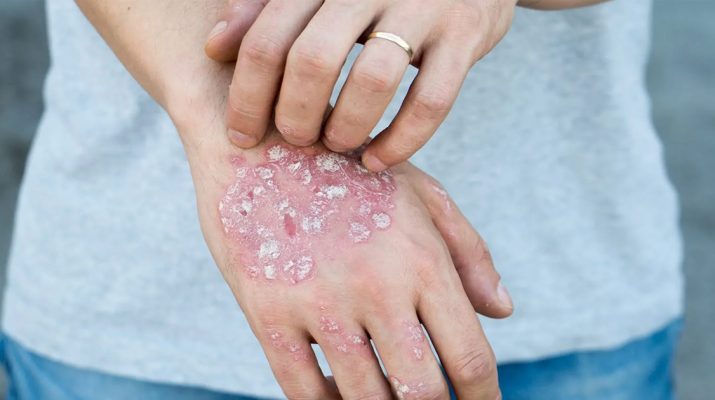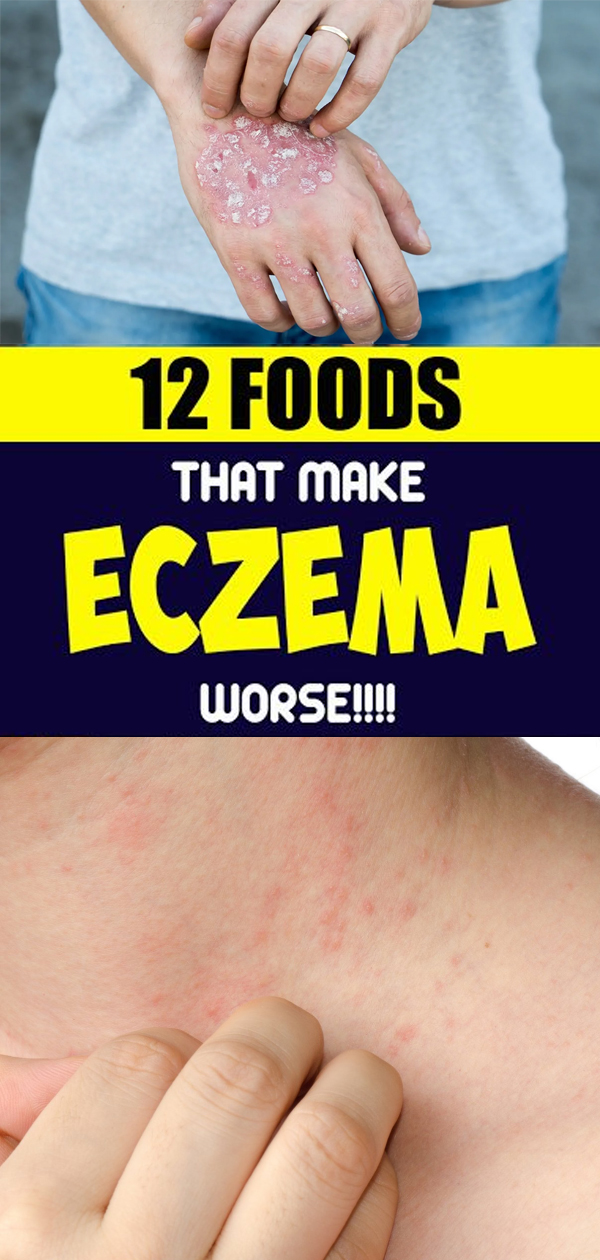Telltale itchy bumps and blisters are the banes of anyone who’s ever dealt with eczema. One hidden culprit might be what you’re eating. Science is still connecting the dots between diet and atopic dermatitis, but one or more of these key foods might be causing or making your flares worse.
This common inflammatory skin condition affects adults, children, and babies. Itchy rashes can pop up anywhere and seemingly at any time. Dermatologists and doctors aren’t always quite certain what causes it. However, your diet, environment, and stress can aggravate and cause symptoms.
Atopic and contact dermatitis are the most common types of eczema. No matter your type, the foods you eat can worsen your symptoms or lead to a flare-up. It’s best to learn your triggers, especially if they aren’t on our list. Every person is different, and some of us have hidden food allergies and intolerances that can cause flares too.
What Causes Flares?
• Food allergy and intolerances
• Allergies—seasonal, environmental, and pet allergies
• Medicines
• Stress—mental, physical, and immune system
• Chemicals
• Fabric
• Breast milk
• Unknown cause
The foods you eat can cause flares or aggravate your symptoms. They can also make a current episode worse. However, some people with atopic and contact dermatitis consume these foods without issue. It’s important to know your body, take notes in a diary of what you ate and anything you came into contact with after a flare occurs. This assists you in ruling out foods as well as environmental causes.
12 Foods That Can Trigger An Eczema Flare
1. Dairy Milk
2. Milk products, including butter, yogurt, cheese, cottage cheese, and sour cream
3. Eggs
4. Soy
5. Gluten
6. Nuts
7. Fish
8. Shellfish
9. Grapes
10. Oranges
11. Tomatoes
12. Processed foods, including bacon, sausage, and lunchmeat.
Eczema Home Remedies
Before you begin self-treating at home, you should identify your triggers. Food is only one way. Stress, sweat, environmental chemical exposure, and other allergies can also cause a flare-up.
Keep a food diary and note your flares. Don’t forget to jot down stress levels, your clothing, and any new soaps or perfumes. This information can assist you and your doctor at determining causes and aggravators.
Consider Working With An Allergist
An allergist will perform a skin test. Positive results allow you to determine what foods you’re allergic to, but the tests aren’t always conclusive for intolerances. Food intolerances can affect your body in numerous ways.
Here is an example, which is a personal experience. After consuming dairy, a lactose intolerant person can have digestive symptoms one time, then have digestive issues and a flare the next. During an active flare, a person’s symptoms worsen when consuming a trigger food
Eczema Friendly Diets
Eczema home remedies should start with your diet. This enables you to root out culprits quickly. Some people prefer a standard elimination diet and later modify their current eating habits based on the results.
The Standard Elimination Diet
Elimination diets take time, and yes, you’ll greatly restrict the foods you can eat. Most people can do this safely at home without a doctor; however, if you suspect a food allergy, you’ll need the guidance of your doctor because of increased anaphylaxis risk.
Some elimination diets remove foods one at a time. Other diets will remove all suspected foods for about three weeks, then slowly add back each food. The idea here is to let your body heal and reset for that small period. This allows you to better judge your symptoms.
If you do remove all foods and your symptoms don’t clear, food is most likely not your culprit. However, several studies support elimination diets for alleviating symptoms. Other studies have found a direct correlation to food intolerances, food allergies, and eczema. In both cases, symptoms disappeared or were greatly reduced.
Other Elimination Diets
• Modified low carb—Paleo, Atkins, and Keto
• Low-FODMAPS
• Fasting Elimination Diet—only under the guidance of a doctor
• Gluten-Free
• Sugar-Free
• Lactose-Free
The major concern will be finding a balance between your nutritional needs and your food lifestyle choice. Elimination diets aren’t always easy, and they can pose challenges and bring new symptoms.
Plant-Based Diets
Vegans and vegetarians can try a modified diet, but again, you’ll need to remove the common culprit foods and still meet your nutritional requirements. Soy, including whole soy foods, can be triggered. Other legumes can be too.
If you prefer a plant-based diet, speak with a nutritionist, doctor, or naturopath before you begin. Even though diet’s one of many eczema home remedies, their guidance can help you succeed without compromising your health. This is especially important for children and infants.
Vitamin And Mineral Supplements
Vitamins and minerals nourish your skin, and they assist in healing inside and out. If you haven’t looked into supplements, you might benefit from some or all listed below. Whole food sources help too.
Vitamins, Minerals, And Supplements
• Vitamin B complex
• Vitamin D
• Vitamin E
• Vitamin C
• Gamma-Linolenic Acid (GLA) or Omega-6 fatty acids
• Probiotics
• Omega-3 fatty acids, such as fish or flaxseed oil if not a trigger
Colloidal Oatmeal Bath
Colloidal oatmeal is a fancy way of saying finely ground oatmeal. One reason doctors and dermatologists recommend this treatment is because it does provide relief. It’s not always convenient to use, but it’s natural and safe for use on children and babies too.
You can purchase readymade packets or grind your own. You’ll need about 1-cup per bath, and you simply add it to your lukewarm water as you fill the tub. Soak for about 10 minutes.
Antihistamine
For severe cases, you might consider taking an antihistamine. These medications can quickly calm itchy rashes and reduce inflammation. However, antihistamines are an unnatural treatment that takes time to work. Long-term use can lead to resistance too.
Essential Oils
Many of the listed essential oils contain antibacterial, antifungal, and anti-inflammatory properties. You can us these in a diffuser, but a topical application with a carrier oil might provide more benefits. Eczema home remedies that use topical essential oils can reduce your symptoms and irritation. The infused carrier oil pulls the healing properties of essential oils into your skin through absorption.
Essential Oils
• Tea tree oil
• Lavender
• Chamomile
• Thyme
• Frankincense
• Basil
• Rose Geranium
• Bergamot
• Eucalyptus
Carrier Oils To Nourish Skin
• Coconut oil
• Olive Oil
• Avocado
• Shea Butter
• Jojoba
• Vitamin E oil
• Rosehip oil
• Sweet Almond oil
Carrier oils make excellent moisturizers on their own. Of course, you can add essential oils to scent them too. With any product, oils included, perform a patch test with oils you haven’t previously used.
Instructions For Using Essential Oils
• Carrier oil of choice
• 3 drops of chosen essential oil
1. To carrier oil, add 3 drops of your preferred essential oil.
2. Mix well.
3. Apply to the affected area.
4. Repeat two to three times a day as needed.
You can create your own blend of essential oils and experiment with the 1:3 ratio too. Please note that the ratio is for adult use only. A 2:3 ratio better suits tender and sensitive skin. Don’t apply essential oils to babies who are under three months old.
While essential oils are generally recognized as safe, you should be aware of precautions with babies and children.
Change Your Routine And Products
From laundry to dish soap and skincare to beauty care, you need to rethink your applications and the products you use too. Keep in mind that natural products can still contain food ingredients that are on the list, and they can still cause or worsen a flare.
This means if you’re sensitive to soy, you shouldn’t use a shampoo with soy keratin. Many products also hide ingredients and fragrances with generic terms. The only way for you to truly know what’s in your products will be to make them yourself.
If overhauling your personal care and cleaning items is too daunting or expensive, tackle one area or product at a time.
Daily Tips
• Keep your skin hydrated inside and out
• Avoid submerging in hot water; shorten shower time
• Pat dry, don’t rub
• Use a moisturizer within 3 minutes after leaving the tub to seal in moisture
• Use unscented, dye-free skin and beauty care
• Switch to mineral-based makeup or wear makeup less often
• Avoid perfumes, but solid perfumes with only herbs and essential oils are okay
• Use plain Castile, oatmeal, or goat’s milk soap
• Avoid triggers
• Use meditation, yoga, and breathing exercises to reduce stress
• Shower after exercise
• Practice safe sunning and use a natural sunscreen
• Don’t scratch
Final Thoughts About Eczema And Eczema Home Remedies
Eczema can disrupt your life. Aside from itching, it can show up anywhere on your body, including your face. An active flare can also lead to more stress, which is counterproductive in treating it. Be sure to relax and use techniques that de-stress on a regular basis.
Certain foods can cause your symptoms to worsen and be the cause. You can use home remedies in combination with an elimination diet to reduce occurrences. In some cases, your symptoms might disappear altogether.
An upside to home treatments is that many of them nourish and protect your skin. Most are safe to use on children and older babies without worrying about harsh chemicals. They’re better for overall health and the environment too.


